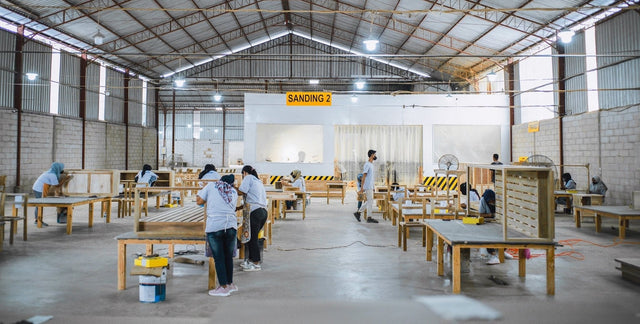Ethical Manufacturing in Java: A Beacon of Safety and Transparency
A cornerstone of Clement Studios's values is Ethical Manufacturing. We have travelled far and wide to find manufacturing partners that prioritise their workers safety and well being above everything else. Western standard safety equipment, practices and ensuring worker rights are maintained at every step from design to delivery.
In recent years, ethical manufacturing has become a critical consideration for consumers and businesses alike. As awareness of environmental and social issues grows, the demand for transparency and safety in production processes has surged. This shift is particularly evident in the furniture manufacturing industry, where Western-owned factories in Java, Indonesia, are setting a high standard for ethical practices compared to the often opaque and unsafe manufacturing processes in China.
Safety Standards: A Priority in Java
Western-owned factories in Java prioritize safety and the well-being of their workers. These factories adhere to stringent safety regulations, often exceeding local legal requirements. Workers are provided with proper training, safety equipment, and a safe working environment. Regular safety audits and inspections ensure that the highest standards are maintained. This commitment to safety not only protects the workers but also enhances the overall quality and durability of the furniture produced.
In contrast, many manufacturing facilities in China have come under scrutiny for their lax safety standards. Reports of unsafe working conditions, lack of proper safety gear, and inadequate training are common. These issues not only endanger workers but also raise concerns about the quality of the products being manufactured. The drive for low-cost production often compromises safety, leading to tragic accidents and long-term health problems for workers.
Transparency: Building Trust through Open Practices
Transparency is another cornerstone of ethical manufacturing in Western-owned factories in Java. These factories operate with a high level of openness, inviting inspections from both local authorities and international certification bodies. They provide detailed information about their sourcing, production processes, and labor practices. This transparency builds trust with consumers, who can be confident that the products they purchase are made under ethical conditions.
In stark contrast, many Chinese factories are notorious for their lack of transparency. The complex and often hidden supply chains make it difficult to trace the origin of materials and the conditions under which products are made. This opacity not only masks unethical practices but also hinders efforts to improve standards. Consumers are left in the dark, unable to make informed choices about the products they buy.
Ethical Sourcing: Supporting Sustainable Practices
Western-owned factories in Java are also committed to ethical sourcing of materials. They often use sustainably sourced wood and other materials, ensuring that their production processes do not contribute to deforestation or environmental degradation. This commitment to sustainability extends to their entire supply chain, promoting responsible practices among their suppliers.
In comparison, the rapid industrial growth in China has often prioritized cost over sustainability. The extensive use of unsustainable materials and practices has led to significant environmental damage. Efforts to enforce sustainable practices are frequently undermined by the sheer scale and opacity of the manufacturing sector.
Empowering Workers: A Focus on Fair Labor Practices
One of the most significant aspects of ethical manufacturing is the treatment of workers. Western-owned factories in Java prioritize fair labor practices, providing their workers with fair wages, reasonable working hours, and benefits such as health insurance and paid leave. These factories often engage in community development programs, contributing to the overall well-being of their workers and their families.
In contrast, many Chinese factories have been criticized for exploitative labor practices. Low wages, excessive working hours, and poor working conditions are prevalent issues. The lack of enforcement of labor laws and the pressure to keep costs low often result in the mistreatment of workers.
A Call for Ethical Consumerism
The comparison between Western-owned factories in Java and many manufacturing facilities in China highlights the importance of ethical manufacturing. By prioritizing safety, transparency, sustainability, and fair labor practices, factories in Java are setting a positive example for the industry. Consumers have a vital role to play in this shift towards ethical manufacturing. By choosing products from companies that uphold these values, they can drive change and promote a more sustainable and just manufacturing landscape.
As the demand for ethical products continues to grow, it is crucial for businesses to embrace these practices and for consumers to support them. Together, we can create a future where manufacturing processes are not only efficient and profitable but also safe, transparent, and ethical.

